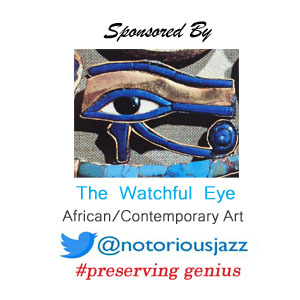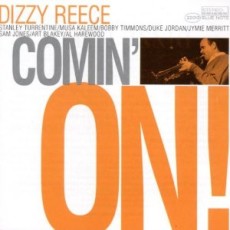
Daily Dose Of Jazz…
Dizzy Reece was born Alphonso Son Reece on January 5, 1931 in Kingston, Jamaica. The son of a silent film pianist, Reece attended the Alpha Boys School, which was famed for its musical alumni. He first took up the baritone saxophone but switched to trumpet at 14. From the age of 16 he was a full-time musician, moving to London in 1948 and spending the 50’s working in Europe with much of his time in Paris.
Reece found himself overshadowed by the innovators of the hard bop style, even though the trumpeter had his own distinctive sound and compositional style. He did, however, work with Don Byas, Kenny Clarke, Frank Foster and Thad Jones among others and winning praise from Miles Davis and Sony Rollins he emigrated to New York in 1959. Struggling through the 60’s, Reece recorded a series of critically acclaimed projects for Blue Note such as “Blues In Trinity”, “Star Bright”, “Comin’ On!” and “Soundin’ Off”.
Remaining active as a musician and writer, Dizzy Reece has recorded over the years with Victor Feldman, Tubby Hayes, the Paris Reunion Band, the Clifford Jordan Big Band, Dexter Gordon, Ted Curson, Duke Jordan, Sun Ra alumni John Gilmore and Philly Joe Jones.
More Posts: trumpet
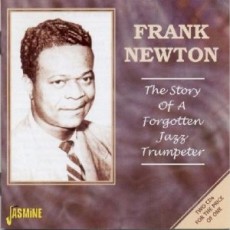
Daily Dose Of Jazz…
Frankie Newton was born William Frank Newton on January 4, 1906, growing up in Emory, Virginia. The trumpeter’s mellow and thoughtful style sometimes seemed out of place in during the swing era, however, he played in several New York bands in the 1920s and 1930s, including bands led by Lloyd Scott, Elmer Snowden, Cecil Scott, Sam Wooding, Chick Webb, Charlie Barnet, Andy Kirk and Charlie “Fess” Johnson.
In the 40s he played with bands led by Lucky Millinder, Pete Brown and Mezz Mezzrow. He played in clubs in New York and Boston, with musicians such as pianist James P. Johnson, drummer Sid Catlett and clarinetist Edmond Hall.
He accompanied Bessie Smith on her final recordings (November 24, 1933), Maxine Sullivan on “Loch Lomond” and several of Billie Holiday’s Café Society recordings, most notably Strange Fruit in 1939.
Although the lyrical trumpeter had a relatively brief but artistically rewarding career producing a couple of recordings, “At The Onyx Club” and “At The Cotton Club”, by the end of the 40’s he became less interested in music and gradually faded from the scene and concentrating more on painting.
Politically, Newton was known to be a communist and as an homage, historian Eric Hobsbawn has written jazz criticism for the New Statesmen under the pen name “Francis Newton”. Trumpeter Frankie Newton passed away on March 11, 1954 in New York City.
More Posts: trumpet
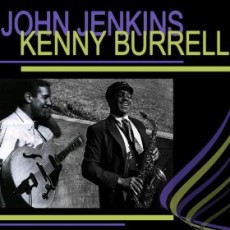
Daily Dose Of Jazz…
The hard bop alto saxophonist John Jenkins was born January 3, 1931 in Chicago, IL where he initially studied clarinet in high school but switched to saxophone after six months on the instrument. He played in jam sessions led by Joe Segal at Roosevelt College from 1949-1956 going on to play with Art Framer in 1955 and led his own group in Chicago later that year.
Jenkins had a sound similar to Jackie McLean and the 50’s saw his most active period. In 1957 he played with Charles Mingus s and recorded two albums as a leader, “Jenkins, Jordan & Timmons” on the New Jazz label and “John Jenkins with Kenny Burrell” on Blue Note.
He played as a sideman with Donald Byrd, Hank Mobley, Paul Quinichette, Clifford Jordan, Sahib Shihab and Wilbur Ware. in the late 1950s and early 1960s, but essentially dropped out of music after 1962, aside from a few dates with Gloria Coleman.
After leaving the jazz world John worked as a messenger in New York and dabbled in jewelry; he sold brass objects at street fairs in the 1970s. After 1983 he began practicing again and playing live on street corners and he played with Clifford Jordan shortly before his death on July 12, 1993.
More Posts: saxophone
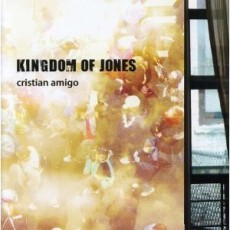
Daily Dose Of Jazz…
Cristian Amigo was born January 2, 1963 in Santiago, Chile. He emigrated with his family to the United States as a young child. At 12 years old, he began studying guitar seriously and two years later the family moved to Miami and began performing with a rock band he formed, Six Feet Under. He attended Hialeah-Miami Lakes Senior School and while a student there taught classes in guitar to his peers. During high school he took courses in music theory, classical guitar and jazz at Miami-Dade Community College.
Amigo entered the music program at Florida State University at age 17, studied classical guitar, then enrolled in the University of Miami and became an active recording session player. His first recording session at age 17 was with Narada Michael Walden prior to moving to Los Angeles to continue his education studying jazz with Kenny Burrell and composition with Wadada Leo Smith, earning a doctorate in Ethnomusicology.
Cristian would go on to become a film composer, bandleader, music producer, jingle producer, concert producer and music teacher at Plaza de la Raza and others. He has performed in African, Arabic, funk, hard rock, free jazz, jazz, and reggae groups working with Hans Zimmer, Wadada Leo Smith, David Ornette Cherry and Carlos Hayre.
His awards include Guggenheim and Van Leir Fellowships, he has been produced by Brooklyn Philharmonic, New York Foundation for the Arts, American Composers Forum, Danish Arts Council among numerous others. Amigo moved to New York City from Los Angeles in 2003 and quickly established himself on the Latin music, free improv, “new music”, and theater scenes, and continues to perform, record and produce.
More Posts: guitar
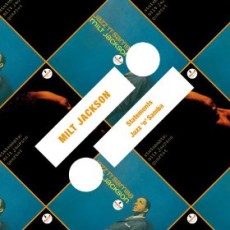
Daily Dose Of Jazz…
Milt Jackson was born Milton Jackson on January 1, 1923 in Detroit, Michigan. Discovered by Dizzy Gillespie and hired in 1946 for his sextet and also for his larger ensembles. He quickly acquired experience working with the most important figures in jazz of the era, including Woody Herman, Howard McGhee, Thelonious Monk and Charlie Parker.
In the Gillespie big band, Jackson fell into a pattern that led to the founding of the Modern Jazz Quartet. He was part of Gillespie’s small group swing tradition within a big band, consisting of pianist John Lewis, bassist Ray Brown and drummer Kenny Clarke. They would become a working group in their own right around 1950 and became the Milt Jackson Quartet but by the time Percy Heath replaced Ray Brown, in 1952 they became the Modern Jazz Quartet.
After some twenty years the MJQ disbanded in 1974 and Jackson pursued more money and his longed for improvisational freedom. The group reformed in 1981, however, and continued until 1993, after which Jackson toured alone, performing in various small combos, although agreeing to periodic MJQ reunions.
He recorded prolifically, his tunes, “Bluesology”, “Bags & Trane”, “The Late, Late Blues” and “Bag’s Groove” are jazz standards. He has recorded with J.J. Johnson, Roy McCurdy, B.B. King, John Coltrane, Wes Montgomery, Hank Mobley, Oscar Peterson, Stanley Turrentine, Don Sebesky, Cannonball Adderley and Ray Charles on the very short list.
A very expressive player, Bags, as he was affectionately known and referring to the bags under his eyes from staying up all night, differentiated himself from other vibraphonists in his attention to variations on harmonics and rhythm. He became one of the most significant vibist and was at the top of his game for 50 years playing bop, blues, and ballads with equal skill and sensitivity. Vibraphonist Milt Jackson, thought of as a bebop player but equally remembered for his cool swinging solos, left the jazz world on October 9, 1999 in Manhattan, New York.
More Posts: vibraphone




